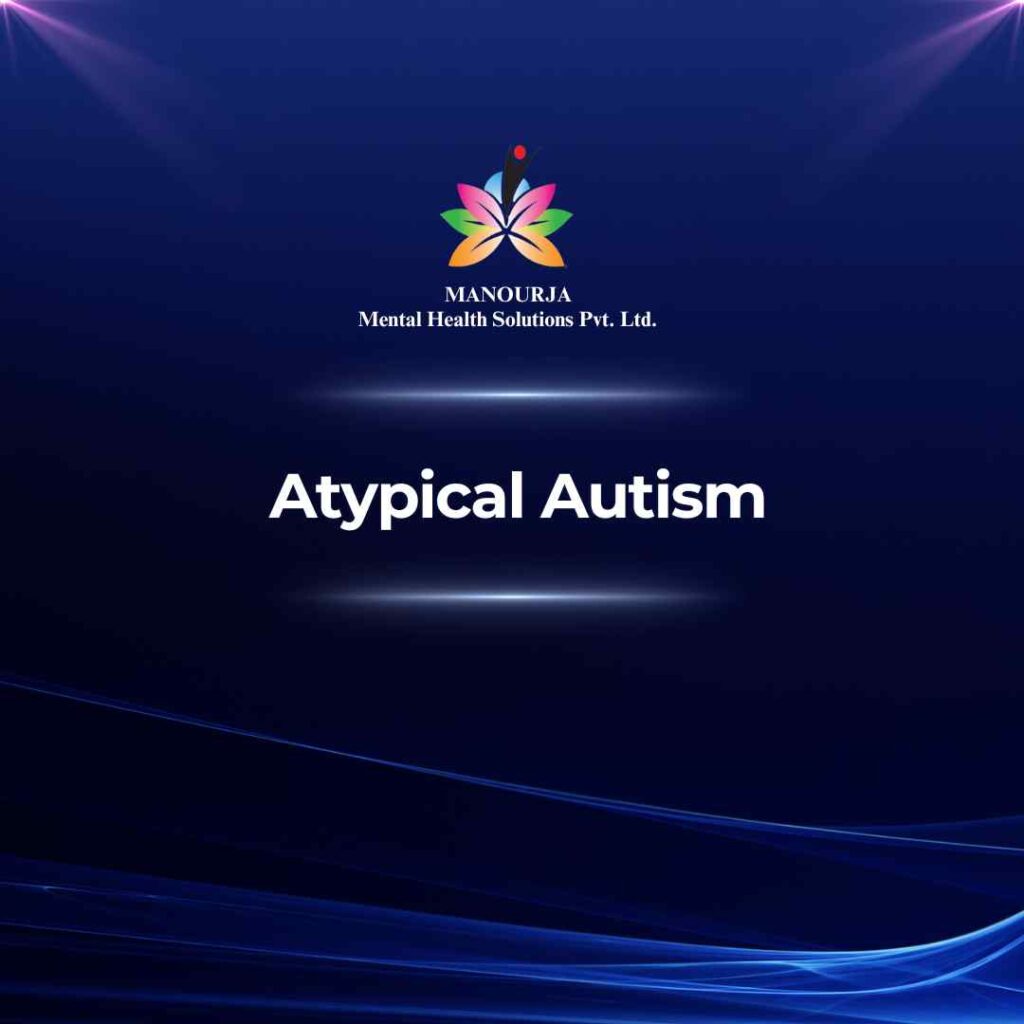Atypical autism

Atypical autism falls under the broader category of Autism Spectrum Disorders (ASD) but differs from typical autism in that individuals do not fully meet the criteria of Autism or Asperger’s Syndrome as defined by diagnostic guidelines like those in the DSM-IV or the ICD-10. These individuals exhibit some autistic behaviors and symptoms but start showing these symptoms only after age three, or their symptomatology does not cover all three core areas of autism: social interaction, communication, and behavior.
Symptoms of Atypical Autism
The characteristics of atypical autism can vary widely from one person to another but generally include a mixture of the following, which may be less pervasive or intense compared to typical autism:
- Social Interaction Challenges: Difficulties in social interactions that may be less severe or different in form compared to those observed in typical autism.
- Communication Issues: Problems with verbal and non-verbal communication that do not fully align with those seen in classical autism cases.
- Restricted and Repetitive Behaviors: Engaging in repetitive behaviors and having restricted interests, though possibly to a lesser extent or in fewer forms than seen in more typical forms of autism.
Forms of Atypical Autism
Atypical autism is itself somewhat of a form or category within the broader autism spectrum. It captures those individuals whose autism-related symptoms do not neatly fit into the conventional diagnostic categories of the autism spectrum defined by the most stringent criteria. It is often used as a diagnosis for:
- Individuals who exhibit significant autism-like behaviors but without a clear history of early developmental abnormalities typical of autism.
- Those who begin to exhibit behaviors characteristic of autism later than is typically observed (i.e., after three years of age).
- Individuals who show symptoms related to autism but only in one or two domains (e.g., significant social difficulties and repetitive behaviors but relatively adequate communication skills).
Treatment of Atypical Autism
Treatment and intervention strategies for atypical autism are tailored to the specific needs of the individual, taking into account the severity and type of symptoms presented. Common interventions include:
Behavioral Therapies:
- Applied Behavior Analysis (ABA): Even for atypical autism, ABA can be effective in teaching specific behaviors and reducing undesirable behaviors.
- Developmental, Individual Differences, Relationship-Based Approach (DIR): Also known as Floortime, it focuses on emotional and relational development through play.
Educational Therapies:
- Structured educational programs that cater to the child’s specific learning needs, strengths, and weaknesses.
- Integration of special education services to support the individual in a mainstream school setting when possible.
Speech and Language Therapy:
- For those who exhibit speech and communication issues, targeted therapy to enhance both verbal and non-verbal communication skills.
Occupational Therapy:
- Focuses on improving sensory integration and fine motor skills, helping the child better manage daily activities and school tasks.
Social Skills Training:
- Group sessions or individual therapy aimed at improving social interaction, understanding social cues, and developing appropriate responses.
Cognitive Behavioral Therapy (CBT):
- For older children and adults, to help manage accompanying symptoms such as anxiety and to teach coping strategies for dealing with social situations.
Family Support and Counseling:
- Education and support for family members are crucial to ensure a supportive environment at home. Counseling for family members can also help in managing stress and emotional burdens associated with caring for a person with atypical autism.
Conclusion
Atypical autism represents a variant of autism spectrum disorders characterized by a divergent pattern of symptoms that do not fully conform to the definitions of more well-known forms. Like all forms of ASD, the treatment for atypical autism is highly individualized and often involves a combination of behavioral interventions, therapeutic supports, and educational accommodations, all aimed at maximizing the individual’s functional abilities and quality of life. Early intervention remains key in achieving the best outcomes.
At MANOURJA, we believe in the transformative power of counseling. Our experienced therapists offer a safe and supportive space where you can explore your thoughts, emotions, and challenges. Through personalized counselling sessions, we’ll work together to develop coping strategies, build resilience, and achieve lasting positive change. Discover the path to a healthier, happier you with MANOURJA counselling services.
MANOURJA Rehabilitation Services
At MANOURJA, we’re dedicated to helping you in rebuild your life, after difficult times. Our rehabilitation services focus on understanding what you need to move forward, whether you’re recovering from addiction, trauma, or any psychological – social challenges. We create personalized plans, that are all about helping you, regain your strength and find hope again. With a caring team by your side, you’ll have the support to make real progress and take steps toward a brighter, healthier future.
